On this week’s post we’re exploring parodies. Parodies take on a genre and point out the absurdities of it. Some of the greats of the past are films like Airplane, and the Naked Gun films, but today, we’re looking at some newer films. One is a pure parody, the other has parody elements, but is much more referential than pure parody. This week’s films are:
Scott Sanders – Black Dynamite (2009)
Dean Parisot – Galaxy Quest (1999)
Both very different films, but the both have the core of the parody. I’ve seen both before, and I think both are amazing. Let’s get into it.
Black Dynamite (2009)
In this film, the hero is Black Dynamite, an orphaned, Vietnam veteran, ex-CIA agent who spends his time helping out the pimpless prostitutes in his neighborhood out of the goodness of his heart. When his younger brother is killed, he goes on a quest to find out who did it, and who is putting the drugs onto his communities streets. He’ll have to gather allies, and hit the streets to clean up the neighborhood. But even Black Dynamite doesn’t realize how high this conspiracy goes.

The film is directed by Scott Sanders and is written by Michael Jai White and Byron Minns. The film also stars Michael Jai White as the hero Black Dynamite. The cast is massive, and is full of recognizable comedic actors like Tommy Davidson, Arsenio Hall, Cedric Yarbrough and tons of character actors as well. The film parodies blaxploitation films from the 70s, which were exploitation films that focused on black characters.
Now, I am not a black man. And I’m not an expert on the black experience in America, and I’d never pretend to be, but I’ll try my best to describe what I’m seeing in these films, and how Black Dynamite embodies their spirit.
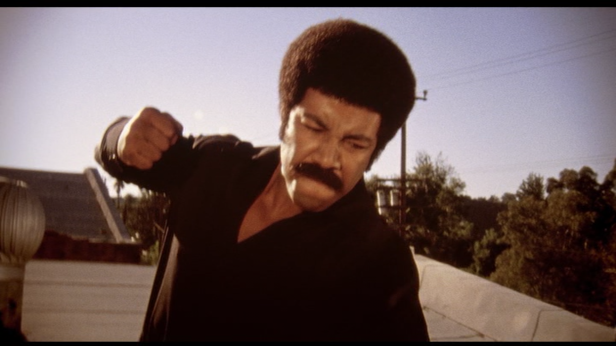
The blaxploitation genre is a subgenre of exploitation films. These films were made cheaply, and were way over the top, lots of sex, lots of violence, and just enough story to get the characters from the sex scene to the action scene to the next sex scene and so on. The film industry was different back then, and it was easier for independent distributors to get their films into theaters. There were lots of drive-ins, and lots of smaller independent theaters that just needed films to show. These films eventually led to some sub-genres, like sexploitation films that were essentially softcore pornography, and blaxploitation films that features black casts and heroes. One of the most famous examples of this genre is Shaft, a film about a tough cop. But Shaft is pretty well-made and acted. Most films of the genre only care about making a film cheaply. Petty concerns like sets, lights and actors are secondary.
But, what exploitation films were able to do is talk about issues that Hollywood films just couldn’t or wouldn’t touch, like sex, rape, drug abuse, and the consequences. These films are studied by scholars today to look at how they reflected different parts of society.
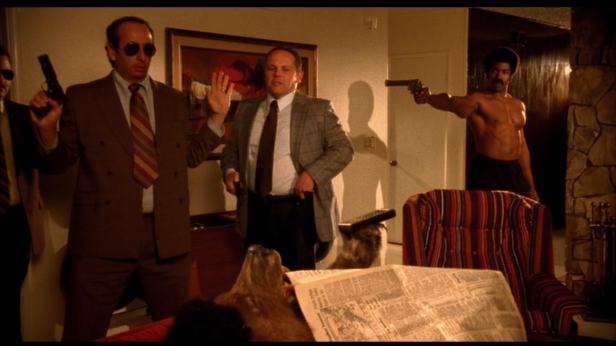
But the other thing that exploitation films were able to do was involve marginalized members of society, who had essentially been erased from Hollywood films, or were playing villains or drug dealers, or pimps. And in blaxploitation films, there were still drug dealers and pimps played by black actors, but black actors were also playing the heroes, and fairly often the villains weren’t the drug dealers, but the people supplying the drugs. These films were not politically blind either. For example, there’s a scene in Shaft where the black characters attack white characters with fire hoses, calling back scenes from the civil rights movement in the 60s. And even when films were just made as a quick cash-in, just the act of making a black character heroic was a political act in the 70s.
So that’s the legacy that Black Dynamite is embodying. And the really interesting thing about this film is how carefully it recreates the genre. It rarely go over the top to make a joke, it goes over the top because that’s what is required by the genre. It simply shows how ridiculous the blaxploitation genre could be, without sacrificing any of the things that made it authentic. It plays it straight for most of the film, until it really pushes the story in the last half hour or so.

I think for a lot of the film, you could play it in the 70s and most people wouldn’t question when it was made. The filmmakers did an amazing job of capturing the spirit of this genre. Black Dynamite is the ultimate hero. He’s always in control, unstoppable in a fight, and women are helpless to his charms. At the beginning of the film, a young man is killed when it’s revealed that he’s an undercover agent at a drug deal. It turns out it was Black Dynamite’s brother. When the cop finds him, he introduces Black Dynamite, talking about how the people who killed his brother don’t know who they’re messing with. He continues describing how much of a bad ass he is, and the film cuts to Black Dynamite himself, simultaneously pleasuring 3 women. We get some gratuitous nudity and all the women discussing how wonderful the sex was, before revealing that there were in fact two other women that Black Dynamite also made love to, who are too tired to comment.
I could run through the plot here, but it’s not really all that relevant. Black Dynamite finds out his brother was killed over drugs, and hits the streets to find out who it is. We learn of his CIA connections and is reinstated at some point. He then declares war on anyone dealing drugs in the community. He cleans up the streets and turns the ghetto into a nice suburban neighborhood, starting a relationship with a woman named Gloria along the way. He finds out about a major shipment of drugs, and takes his whole crew there, but not finding all the drugs. They eventually discover that the new brand of malt liquor being heavily advertised actually has a drug that shrink penises. This discovery leads Black Dynamite to his old nemesis, Dr. Wu on Kung Fu Island (seriously). But the plot doesn’t end there. It actually goes all the way to the very top. Black Dynamite has a final confrontation with none other than President Nixon himself.
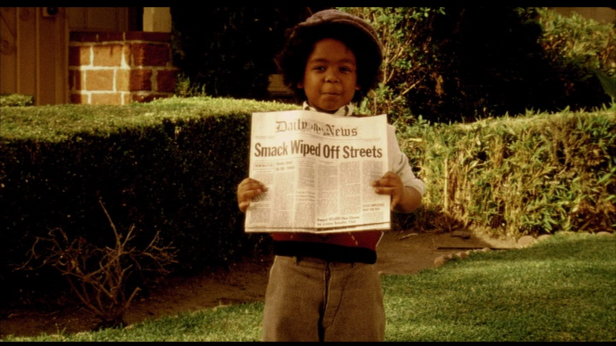
It’s not the plot that makes this film special though, it’s the attention to detail. Michael Jai White plays the perfect blaxploitation hero. He looks great in a fight, is completely full of himself, and is able to be badass while also being a bad actor. Not to say White is a bad actor, but he’s playing a character who is a bad actor. That’s a much harder thing to do than it might seem. The film also includes a fun music sting everytime Dynamite does something cool, and includes a few songs that simply explain the action that’s happening on screen. In addition, the relationship between Dr. Wu and Dynamite is never explained, he just appears as a major villain with no explanation
The film doesn’t just match the aesthetic of the setting, it also matches things behind the scenes. The filmmakers put in intentional mistakes and awkward moments, just like a real blaxploitation film would. There’s a scene where Dynamite stands up for a dramatic speech, and the camera is too slow, moving about two seconds after he does. Then the boom mic is in the shot. Dynamite clearly notices it, but continues his speech. In another moment, during a fight scene, Black Dynamite’s ally Bullhorn throws a punch, and instead of missing, it hits. The other actor is clearly angry and about to start a real fight when the film cuts, and another actor appears in the scene. Bullhorn continues the fight as if nothing had happened. These are the kinds of shortcuts that exploitation films of all kinds would make. And of course, the film gets a lot of mileage out of green screen driving scenes.
Thoughts
This film is a perfect parody. It makes great jokes about the source material, while staying true to the source material. The love and affection the filmmakers have for this genre is clear on screen at all times. So this isn’t just a parody making cheap jokes about low-rent filmmakers. This is a celebration of the genre, a tribute even. And I think anyone who has enjoyed an exploitation film in the past needs to take a look at this one.
Galaxy Quest (1999)
In this film, the cast of a long canceled, but well-loved show are living off the success of the show, going to conventions and meeting fans. Most of the cast is dejected, wishing they had something else going on in their careers to avoid this fate, but Jason Nesmith, the man that played the captain eats it up, loving the attention. Until one day a group of fans approaches him, who he assumes are asking him to star in a fan film, when he goes with them, though, he suddenly finds himself in space stuck in the middle of a real-life sci-fi drama. The aliens have seen the television show he starred in, and assumed it was all real and he is a capable starship captain. Jason goes along with it, even recruiting the rest of his crew. But how long will be be able to keep up the charade, and what happens when the gentle aliens discover he’s not who they think he is?
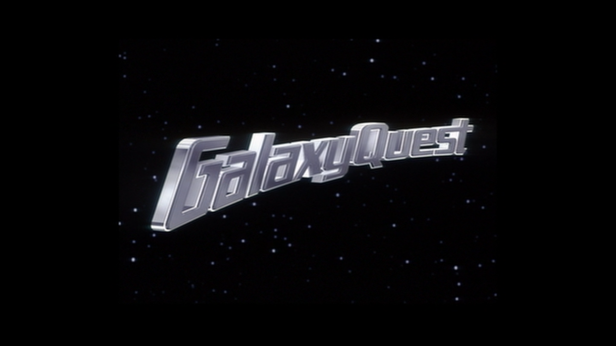
The film is directed by Dean Parisot who isn’t well-known, but is a solid working director. But the cast in this film is amazing. Tim Allen isn’t necessarily known as a great actor, but he’s a big star, even bigger at the time. And the supporting cast includes Sigourney Weaver, Alan Rickman, Tony Shaloub and Sam Rockwell. These are some of the best actors of that generation. Not to mention future stars like Justin Long and great character actors like Enrico Calontoni, Daryl Mitchell and Rainn Wilson. Even in 1999 the film had a great cast, but looking back from 2018, it’s almost unbelievable how good the cast was.
This film isn’t a direct parody, but it certainly invokes the spirit of Star Trek, and how the series wandered the desert for awhile before being rediscovered by the general public in the late 70s when the films started to be made again. Of course, the serious fans never forgot Star Trek, just as we see from the fans of Galaxy Quest. But the various cast members of Star Trek weren’t always so appreciative of their brand of fame. Leonard Nimoy in particular struggled with it, writing a book called “I Am Not Spock” at one point, before later embracing the role later on, writing a book called “I Am Spock.”

But this film places the characters in the shoes of actors whose TV show was never rediscovered, and were never able to recapture the success they had on the original show. They live in a kind of purgatory, never able to move on from these characters they played, and participating in increasingly humiliating experiences to make a living in the decades since. Sigourney Weaver’s character Gwen played a communication officer on the show whose only job was to repeat what the computer said, Alan Rickman’s character Alexander played an alien on the show that has an obsessive following that he can’t stand. Daryl Mitchell’s character Tommy was a child when the show was on the air, and Tony Shaloub’s character Fred is incredibly laid back, just enjoying the ride. But all of them wish they could be doing something else, except of course for Jason.
The film does a great job of introducing us to the real alien world. Jason has been talking about an appearance in a fan film he’s going to make. When he first encounters the aliens, he just assumes they’re playing parts. He overhears some fans making fun of him as a pathetic joke and gets drunk that night, leading to a major hangover the next day when the aliens return. Jason doesn’t notice being transported aboard the alien ship, and doesn’t realize that he’s not in a fan film. He simply plays his part half-heartedly, telling the aliens to attack the person he’s supposed to be negotiating with, just as a way to get out of the gig as quickly as possible. He doesn’t realize anything is wrong until the aliens send him back to earth, via a teleportation device that shoots him through a black hole.

When he returns, he’s thrilled, and wants to tell his castmates about the experience at their next gig, which he has missed. They of course don’t believe him, and when the aliens reappear to ask him to come back, Jason invites them all to come with him. The initially walk away, but Fred mentions that it might be a good gig. The others suddenly realize that if he’s inviting them to a gig there might be a paycheck involved, and they have made an agreement to only work as a team. When they find the alien, they again assume that they’re going to a fan film set. But when they are also transported through space, they realize what’s happening.
The aliens are called Thermians, and they are a peaceful race that has been targeted by the evil Serris, a bug like alien who is ruthless and cruel. The Thermians are simple and kind. Not understanding the concept of lies or make believe. When the television transmissions of the Galaxy Quest show appear in their world, they assume they are historical records, and begin modeling their society after the show. Being technologically advanced, they built the ship from the show as close as they could based on what they saw.
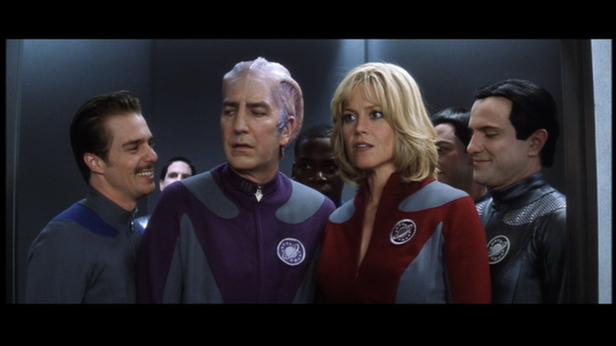
When the actors get there, they assume it will just be a fun simple adventure. But things get real very quickly when the crew take their places on the bridge and realize pretending to be astronauts is much easier than actually being astronauts. Serris returns to take revenge on the Thermians who took him by surprise. The crew realizes they have no idea what they’re doing, and just barely survive the encounter.
So the film becomes pretty complex at this point. The actors now have to really be the heroes they’ve pretended to be, seeing the complete faith the Thermians have in them. But they can’t fake it, as Serris is willing and even eager to kill all of them. They have to actually succeed.

The film is full of nice little details and character moments, as the actors all begin to understand what they mean to people. Alexander has the biggest leap here, as he loathes the character he played, but meets an alien who idolizes his character. When he sees how much strength and guidance his character has offered to him, he gains some respect. But when the alien dies in an altercation with Serris’s forces, Alexander embraces his character, saying the line he hates more than anything to the alien in his dying moments to give him comfort.
In addition, Sam Rockwell’s Guy tags along, having guest starred on an episode near the end of the run. But when he discovers it’s real, he suddenly realizes that he’s the expendable one. It’s a great character and Rockwell has a few good turns as this character.

By the end of the movie, all the characters have grown, and are ready to embrace their roles on the show. They triumph, and return to earth, crashing into the same sci-fi convention they attended earlier in the week. The film ends with them getting a rebooted TV series, all in their original roles, with some new cast members they met along the way.
Thoughts
I kept the plot details light on this one, because I think this one is best experienced. This isn’t known as an all-time great film, but I find it one of the best written, best directed, most satisfying movies of all time. It’s one of those films I just never get tired of, no matter how many times I see it. I’m always in the mood for it. It’s not the most emotionally complex film, it doesn’t deal with serious issues, it’s just a really simple, honest, human story, with a great setting.
The Double Feature
These films don’t actually go together all that well, except in one respect. They’re both incredibly fun to watch, and really enjoyable. As parodies, of course Black Dynamite takes the prize, but I included Galaxy Quest as a parody because it embodies the specific feeling of the Star Trek universe so well. If you’re a big Star Trek fan like me, then you see a lot of deeper meaning and references to specific events, but even if not, it’s still a really good story, and casual fans of Star Trek would still see the threads.
Likewise, you don’t need to be a fan of exploitation or blaxploitation films to enjoy Black Dynamite, but there are little references that you might pick up if you are. For example, at one point, Black Dynamite tells someone he might make them ‘stick themselves’. I’m not totally sure, but I believe this is a reference to a film called The Mack, in which a character forces another to stab themselves with a knife, screaming “Stick yourself!” at them.
But regardless, both films are great to watch, and a nice relaxing and satisfying experience.
Reflection
I’m writing this on Oscar’s night. I haven’t seen many of the films this year. It used to be a major part of my ritual every year, but the past few years I haven’t really gotten involved. I still haven’t seen Moonlight from last year’s Oscars, but I think that’s ok. I’m ok with experiencing film on my own terms. When I had a podcast on film, I felt obligated to watch everything, and watched a lot of things that I normally wouldn’t really care for. And admitting you hadn’t seen this film or that film was met with shock and surprise. It was never a pleasant experience.
There are things I miss about the podcast. Like interviewing people, and meeting interesting people. But I don’t miss having to force myself to stay on the cutting edge of movies. It was exhausting. What I like about this blog is that I can watch whatever I like, and write about whatever I like. It’s liberating.
So what about next week. Well my old standby Filmstruck just added a ton of all-time classic movies to their library. I’m going to focus on some of these for the next few weeks, and try to knock out some of the holes that I have in my film viewing. Lets start with:
Irving Rapper – Now, Voyager (1942)
William Wyler – The Best Years of Our Lives (1946)
I’ve never actually seen either of these films, though I’ve known about both for quite awhile. I’ll talk about some of what I know next week.
See you then.
